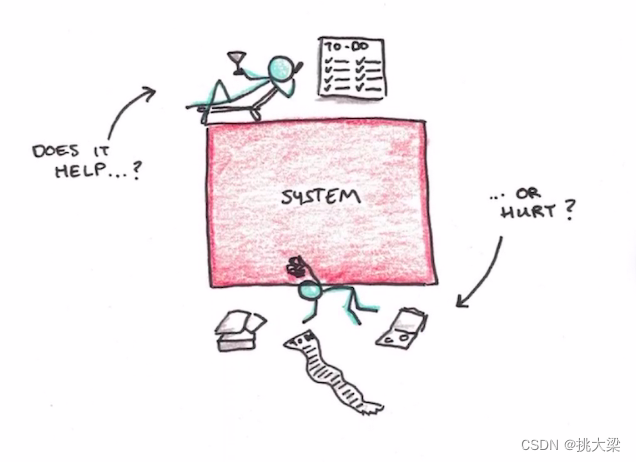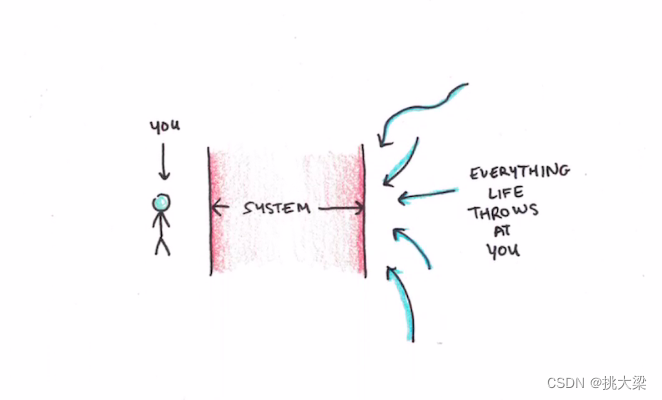Easily the best habit I’ve ever started was to use a productivity system.The idea is simple:organizing all the stuff you need to do (and how you’re going to do it) prevents a lot of internal struggle to get things done.
无疑,我曾经建立过的最好的习惯就是使用一个生产力系统。想法很简单:把所有你需要做的事情(以及你准备如何做)系统化,可以避免许多内心的纠结,从而完成事情。
There’s a ton of system out there.Some are elaborate, like Getting Things Done.Others are dead-simple, such as simply using a prioritized daily to-do list.Some require software.Many you can do with just pen and paper.
存在无数生产力系统。有些复杂详尽,例如尽管去做(GTD)方法;另一些十分简单,例如只用一个经过优先级排序的每天待做事项列表。有些需要软件的辅助,也有许多只要纸笔就可以进行。
Being successful with a long-term system is hard.Here are just a few common problems:
成功地长期使用一个生产力系统是很难的,以下仅列出一些常见的问题:
You have no idea which system to pick, or when you do pick something you constantly second-guess yourself that you’re “doing it right”
你不知道应该选择哪个系统,或者当你选定了一个系统之后,会不断猜测自己是否“做对了”。
You get a burst of enthusiasm each time you try it , are productive for about two weeks, then you start to slack off and eventually abandon it.
每次刚开始时,你都满腔热情,高效地坚持了差不多两个星期,然后你就开始松懈,最后干脆放弃。
The system never seems to “fit right” for your life, yet you’re convinced the problem is that you don’t know how to work within it.
这个系统从来没有“适合”过你的生活,而你却认为,问题在于你不知道如何在它的要求下工作。
The system you’ve chosen feels like a slowly constricting prison you’ve made for yourself, choking off your will to do meaningful work and turning you into a robot.
你选择的系统就好像是你为自己制作了一个缓慢收紧的监狱,扼杀了你想要做有意义工作的意愿,而把你变成了一个机器人。
These problems can be avoided, but it takes a little thinking about what the point of having a system is and what it can and cannot do for you.
这些问题是可以避免的,但需要思考一下,拥有一个生产力系统的意义是什么,它能为你做什么、不能做什么。

Why Use a System at All?
究竟为什么要用生产力系统?
Ultimately, everybody has a system for productivity.There are really only three different kinds:
归根结底,每个人都有一套生产力系统。其实只有三种不同的类型:
The system of other people.You simply respond to the pressures put on you by colleagues, clients, bosses or family members.Big deadline tomorrow?I guess you’re working late on it.
依靠别人的系统。你只是在对同事、客户、老板或家人给你的压力做出反应。明天是大限?我猜你要加班了。
The system of feelings and moods.Feeling creative today?You might get a loft of work done.Does that thing that seemed interesting before now seem dull?I guess you’re not working on it .At its best, this can be fun and spontaneous.At its worst it can be soul-crushing to see you never make more than fleeting progress on anything with an ounce of frustration.
感受和情绪的系统。今天感觉很有创造力?你或许可以完成很多工作。此前看起来很有趣的事,现在是不是显得很沉闷?我猜你没有在做它。在最好的情况下,这可能是有趣且自发的;但在最坏的情况下,看到你从未在任何令人感到有点挫败的事情上取得超过昙花一现的进展,那简直令人心碎。
A system of your own design.In this case, you create guidelines for yourself that structure your efforts.Moods and outside pressures still matter, but they’re no longer the only guiding factor about what to work on, how much and how often.
你自己设计的系统。在这种情况下,你为自己制定规则,组织你的行动。情绪和外界压力仍然重要,但它们不再是指导你做什么、怎么做,以及多久做一次的因素。
Building the habit of a productivity system is about self-consciously creating a buffer between you and temporary emotions or external agents.You still need to respond to deadlines and listen to your emotions, but those aren’t the only things you heed when planning your day.
建立生产力系统的习惯,就是有意识地在你自己和暂时的情绪或外部力量之间建立一个缓冲区。你仍然需要回应最后期限、要倾听自己的情绪,但它们不再是你规划一天时唯一考虑的事情。

保持长期高效的七个法则(一)7 Rules for Staying Productive Long-Term(1)
本文来自互联网用户投稿,该文观点仅代表作者本人,不代表本站立场。本站仅提供信息存储空间服务,不拥有所有权,不承担相关法律责任。如若转载,请注明出处:http://www.mzph.cn/news/736585.shtml
如若内容造成侵权/违法违规/事实不符,请联系多彩编程网进行投诉反馈email:809451989@qq.com,一经查实,立即删除!相关文章
【初始MongoDB】MongoDB的使用(对比MySQL)
MongoDB简介
1、NoSQL简介
NoSQL(NoSQL Not Only SQL),意即反SQL运动,指的是非关系型的数据库,是一项全新的数据库革命性运动,早期就有人提出,发展至2009年趋势越发高涨。NoSQL的拥护者们提倡运用非关系型的数据存储…
Qt 数据库驱动未装载MYSQL
一、第一部分
0.Qt 连接mysql数据库时报错: QSqlDatabase: QMYSQL driver not loaded QSqlDatabase: available drivers: QSQLITE QODBC QODBC3 QPSQL QPSQL7 QT连接代码:
bool createMysqlConn()
{QSqlDatabase sqldb QSqlDatabase::addDatabase(&qu…
如何配置固定TCP公网地址实现远程访问内网MongoDB数据库
文章目录 前言1. 安装数据库2. 内网穿透2.1 安装cpolar内网穿透2.2 创建隧道映射2.3 测试随机公网地址远程连接 3. 配置固定TCP端口地址3.1 保留一个固定的公网TCP端口地址3.2 配置固定公网TCP端口地址3.3 测试固定地址公网远程访问 前言
MongoDB是一个基于分布式文件存储的数…
Java建造者模式源码剖析及使用场景
一、介绍 Java 中的建造者模式(Builder Pattern)是一种创建型设计模式,它将一个复杂对象的构建与它的表示分离,使得同样的构建过程可以创建不同的表示。该模式主要用于创建一些复杂的对象,这些对象内部由多个部分组成,各部分之间存在着复杂的相互依赖关系。
二、有什么好处&am…
JVM工作原理与实战(四十三):JVM常见面试题目
专栏导航 JVM工作原理与实战 RabbitMQ入门指南 从零开始了解大数据 目录
专栏导航
前言
一、JVM常见面试题目
1.什么是类加载器,有哪些常见的类加载器?
2.什么是双亲委派机制,以及如何打破双亲委派机制?
3.如何判断堆上的对…
Hive超市零售案例
超市零售案例
一、部分数据展示
Fiskars 剪刀| 蓝色,61,中国,华东,杭州,用品,曾惠,2,浙江,办公用品,US-2019-1357144,130
GlobeWeis 搭扣信封| 红色,43,中国,西南,内江,信封,许安,2,四川,办公用品,CN-2019-1973789,125
Cardinal 孔加固材料| 回收,4,中国,西南,内江,装订机,许…
Unity性能优化篇(十) 模型优化之网格合并 Easy Mesh Combine Tool插件使用以及代码实现网格合并
把多个模型的网格合并为一个网格。可以使用自己写代码,使用Unity自带的CombineMeshes方法,也可以使用资源商店的插件,在资源商店搜Mesh Combine可以搜索到相关的插件,例如Easy Mesh Combine Tool等插件。 可大幅度减少Batches数量…
css flex 布局换行
默认使用display: flex;是不换行的,只需要加上flex-wrap: wrap;就行了,效果图 .app-center {display: flex;flex-wrap: wrap;justify-content:flex-start;
}
通过上面我们发现虽然时间换行了,但是每行的边距不一样
加上这个就行了ÿ…
Jupyter Notebook使用教程——从Anaconda环境构建到Markdown、LaTex语法介绍
0. 前言 按照国际惯例,首先声明:本文只是我自己学习的理解,虽然参考了他人的宝贵见解及成果,但是内容可能存在不准确的地方。如果发现文中错误,希望批评指正,共同进步。 你是否在视频教程或说明文档或Githu…
软件测试面试:接口自动化测试面试题(含答案+文档)
🍅 视频学习:文末有免费的配套视频可观看 🍅 关注公众号【互联网杂货铺】,回复 1 ,免费获取软件测试全套资料,资料在手,涨薪更快 1、json和字典的区别?
Json是轻量级的数据交互格式…
ChatGPT 基本用法!ChatGPT4的prompt的使用例子!
授人以鱼,不如授人以渔。这句话在AI领域尤为贴切,尤其是在构建与AI模型交互的prompt(提示)时。OpenAI在Discord官方服务器上设有一个名为prompt-library的频道,这里聚集了各种创意和专业的prompt,涵盖了从写…
Linux C 中执行shell命令
文章目录 摘要前言exec函数的使用system函数使用popen函数的使用 摘要
本文尝试使用exec,system,popen函数,来执行一个shell命令。(1) 如果只需要执行命令后的返回值,不关心标准输出,错误输出,可以使用system函数。(2) 如果希望拿…
基于java+springboot+vue实现的火车票订票系统(文末源码+Lw)294
摘要
火车票订票系统可以对火车票订票系统信息进行集中管理,可以真正避免传统管理的缺陷。火车票订票系统是一款运用软件开发技术设计实现的应用系统,在信息处理上可以达到快速的目的,不管是针对数据添加,数据维护和统计…
HAproxy反向代理与负载均衡
目录 一、HAproxy介绍
1. 概述
2. 关于4/7层负载均衡
2.1 无负载均衡
2.1.1 图示
2.1.2 说明
2.2 四层负载均衡
2.2.1 图示
2.2.2 说明
2.3 七层负载
2.3.1 图示
2.3.2 说明
3. 特性
4. HAProxy负载均衡常见策略
5. 处理模式
二、HAproxy安装
1. yum安装
2. 第…
Vue - v-if和v-else-if和v-else的使用
一、简单的演示
<body><div id"app"><p v-if"score>90">优秀</p><p v-else-if"score>60">及格</p></div><script src"../js/vue.js"></script><script>const app…
3月11日代码随想录电话号码的字母组合
17.电话号码的字母组合
给定一个仅包含数字 2-9 的字符串,返回所有它能表示的字母组合。答案可以按 任意顺序 返回。
给出数字到字母的映射如下(与电话按键相同)。注意 1 不对应任何字母。 示例 1:
输入:digits &q…
mysql的索引、事务、分库分表问题
1.了解MySQL的索引吗?它为什么使用Btree作为底层,而不是其他呢? 这里我们要谈的是其他数据结构的缺点,然后说说Btree的优点,也就看你对MySQL的Btree与其他数据结构熟不熟悉。 Hash (1)Hash 索引…
Error running ‘Attach debug to process‘
这里写自定义目录标题 Ubuntu导入源码调试遇到错误 Ubuntu导入源码调试遇到错误
打开调试UI,选择system_process进程,直接右下角弹出错误对话框。错误如下:
Error running ‘Attach debug to process’ Unable to find project context to …
[HackMyVM]靶场 Espo
kali:192.168.56.104
主机发现
arp-scan -l
# arp-scan -l
Interface: eth0, type: EN10MB, MAC: 00:0c:29:d2:e0:49, IPv4: 192.168.56.104
Starting arp-scan 1.10.0 with 256 hosts (https://github.com/royhills/arp-scan)
192.168.56.1 0a:00:27:00:00:05 (Un…

)



:JVM常见面试题目)

 模型优化之网格合并 Easy Mesh Combine Tool插件使用以及代码实现网格合并)


)


294)





![[HackMyVM]靶场 Espo](http://pic.xiahunao.cn/[HackMyVM]靶场 Espo)